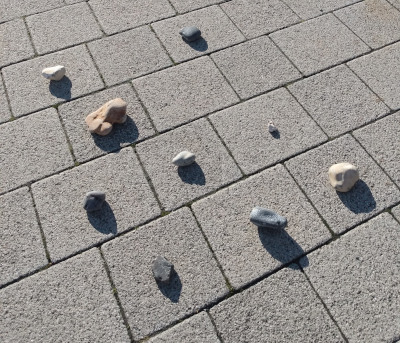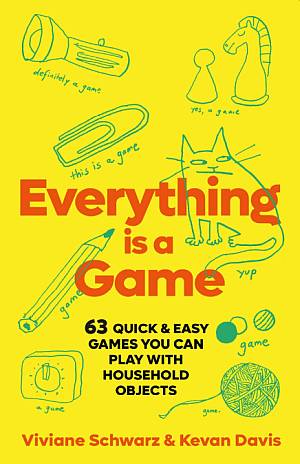
A game of Feral Chess in progress.
Feral Chess is a way of playing a two-player abstract boardgame on any patterned surface with whatever pieces you happen to have to hand. A game for cafe tables and paving stones.
Prep
Find a board
Look around for some kind of grid pattern on a flat surface, where it's clear which spaces are adjacent to which others, and whether any "lines" of movement exist.
If your board has ambiguous boundaries (such as incomplete half-tiles around the edges) or immovable obstacles, agree between you on what does and doesn't count as a space. If your board is very large, decide whether to mark off a smaller section of it as the playing area, or to allow extremely distant moves.
Find some pieces
Gather (or construct) a couple of handfuls of objects which can be roughly divided into two colours, and grouped into different classes of shape - such that for any given object, its shape and colour is clear to both players. For a decent chesslike game you'll want several different shapes.
Deciding moves
For each different shape of piece in the game, give it a name and define how it moves, and whether it has any other special rules or abilities. Collaborate on ideas or make up separate ones.
Some examples:-
- Ghost: Moves like a bishop but can't capture or be captured.
- Wizard: Moves one square orthogonally, or to any empty square on the board.
- Beserker: Moves like a knight. When capturing, also capture all adjacent pieces (including your own).
- Lure: Moves like a queen, but not more than four spaces. If your opponent can capture this piece, they must do so.
- Fire: Doesn't move but can add a copy of itself to an adjacent square (capturing anything there).
Each player should also have a unique piece designated as their "king". This is usually best kept as a regular "move one space in any direction" chess king so that it can't easily escape from check, but it's up to you.
Setup
One player takes all of the pieces and sets the board up however they like. It can be a symmetrical chess-looking lineup of rival ranks across an empty space, or whatever they want. The player can discard some pieces or seek out additional duplicates as they see fit.
When the board is set up, the other player chooses which of the two sides they want to play as, and who will move first. (This is so that the player setting up is incentivised to place the pieces as fairly as possible.)
Play
The game then plays out as chess; players take turns to move one of their own pieces to an empty or enemy-occupied square, capturing in the latter case. If a king could be captured on the next turn then it's in check, and its owner loses to a checkmate if they can't extricate it from check on their next turn. The king also can't move into check.
If an unanticipated ambiguity or gap in the rules emerges during the game (eg. a "when captured, move this piece to an adjacent space instead" piece that unexpectedly gets taken while all its adjacent spaces are occupied), agree on a solution that both players are happy with, and play on under that version of the rule. If they cannot agree, end the game in a stalemate.
